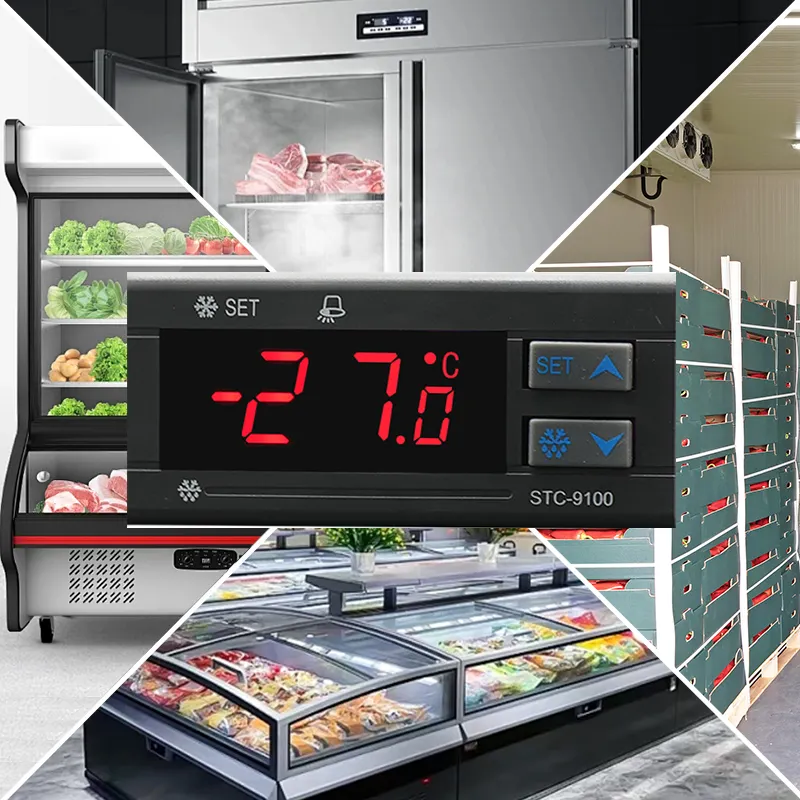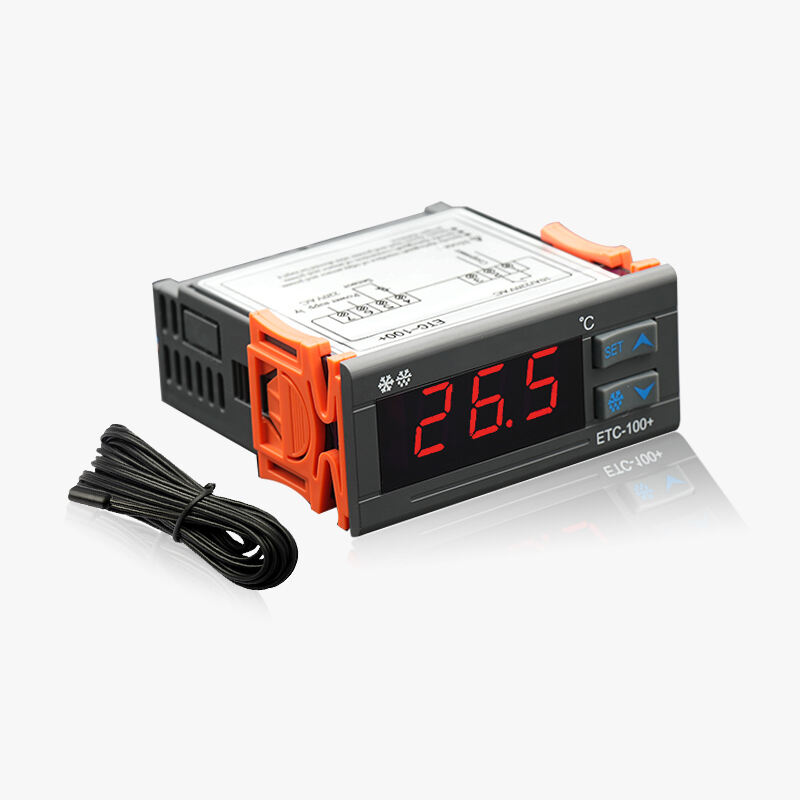The Evolution of Smart Refrigeration Technology
The landscape of home and commercial refrigeration is undergoing a revolutionary transformation as we approach 2025. Modern temperature controller systems are becoming increasingly sophisticated, offering unprecedented precision and efficiency in maintaining optimal cooling conditions. These advanced systems represent a significant leap forward from traditional mechanical thermostats, incorporating smart sensors, artificial intelligence, and connectivity features that were once considered futuristic.
Today's temperature controller technology goes beyond simple temperature maintenance. These systems actively learn from usage patterns, adjust to environmental conditions, and provide real-time monitoring capabilities that help prevent food spoilage while maximizing energy efficiency. As we delve deeper into this technological advancement, we'll explore how these innovations are reshaping our approach to food preservation and energy management.
Core Components of Modern Refrigeration Systems
Smart Sensor Integration
At the heart of modern refrigeration systems lies an advanced temperature controller equipped with multiple smart sensors. These sensors work in harmony to monitor various parameters including ambient temperature, humidity levels, and door opening frequency. The integration of these sensors enables the system to maintain precise temperature zones and respond quickly to environmental changes.
The latest sensor technology includes infrared temperature monitoring, wireless connectivity, and self-calibrating mechanisms that ensure long-term accuracy. These components communicate continuously with the central temperature controller unit, providing a comprehensive view of the refrigeration system's performance and enabling predictive maintenance capabilities.
Digital Control Interface
Modern temperature controller interfaces have evolved from simple dial controls to sophisticated digital displays with touch-screen capabilities. These interfaces provide users with detailed information about temperature zones, power consumption, and system status. The intuitive design allows for easy temperature adjustments while offering advanced features such as scheduling and custom cooling profiles.
Interactive dashboards now display real-time analytics, temperature history, and energy usage patterns. This wealth of information helps users optimize their refrigeration settings for both food safety and energy efficiency. Many systems also include mobile app integration, enabling remote monitoring and control of temperature settings.

Advanced Features and Capabilities
AI-Powered Temperature Management
Artificial intelligence has revolutionized how temperature controller systems operate. These smart systems can predict usage patterns, automatically adjust cooling cycles, and optimize performance based on historical data. AI algorithms analyze factors such as frequent access times, ambient temperature fluctuations, and seasonal changes to maintain ideal conditions while minimizing energy consumption.
Machine learning capabilities enable the temperature controller to adapt to specific usage scenarios, creating personalized cooling profiles that balance food preservation needs with energy efficiency goals. This intelligent approach to temperature management represents a significant advancement in refrigeration technology.
Energy Optimization Systems
Modern temperature controller units incorporate sophisticated energy management features that significantly reduce power consumption. These systems utilize variable-speed compressors, smart defrost cycles, and adaptive fan control to maintain optimal temperatures while minimizing energy usage. The integration of energy-efficient components with intelligent control algorithms can result in substantial power savings.
Advanced power monitoring features provide detailed energy consumption analytics, helping users identify opportunities for further efficiency improvements. Some systems even incorporate renewable energy integration capabilities, allowing for seamless operation with solar power systems and smart grid technologies.
Connectivity and Smart Home Integration
Internet of Things (IoT) Features
Contemporary temperature controller systems leverage IoT connectivity to provide enhanced functionality and convenience. These connected devices can communicate with other smart home systems, sharing data and coordinating operations for optimal performance. The IoT integration enables features such as automatic temperature adjustments based on home occupancy, remote troubleshooting, and predictive maintenance alerts.
Cloud-based monitoring systems allow users to access their refrigeration data from anywhere, while also enabling manufacturers to provide remote support and software updates. This connectivity ensures that temperature controller systems remain current with the latest features and security protocols.
Mobile Control and Monitoring
Mobile applications have become an integral part of modern refrigeration systems, offering convenient access to temperature controller functions through smartphones and tablets. These apps provide real-time monitoring, alert notifications, and the ability to adjust settings remotely. Users can receive immediate notifications about temperature fluctuations, door-open alerts, or potential system issues.
Advanced mobile interfaces also offer features such as voice control integration, custom scheduling, and detailed performance reporting. This level of mobile accessibility transforms how users interact with their refrigeration systems, providing unprecedented control and peace of mind.
Future Developments and Trends
Sustainable Cooling Solutions
The future of temperature controller technology is increasingly focused on sustainability. Manufacturers are developing systems that use environmentally friendly refrigerants, incorporate recycled materials, and achieve higher energy efficiency ratings. These innovations help reduce the environmental impact of refrigeration while maintaining optimal performance.
Research into new cooling technologies, such as magnetic refrigeration and thermoelectric systems, promises to revolutionize how temperature controller systems operate. These developments could lead to even more efficient and environmentally friendly cooling solutions in the coming years.
Enhanced Food Preservation Technology
Next-generation temperature controller systems are incorporating advanced food preservation features. These include specialized cooling zones with precise temperature and humidity control, UV sterilization systems, and ethylene gas filters to extend produce freshness. Smart sensors can even detect food freshness levels and adjust storage conditions accordingly.
The integration of these preservation technologies with intelligent temperature control systems helps minimize food waste while ensuring optimal storage conditions for different types of food items. This advancement in food preservation capability represents a significant evolution in refrigeration technology.
Frequently Asked Questions
How does a smart temperature controller improve energy efficiency?
A smart temperature controller improves energy efficiency through various mechanisms including adaptive learning algorithms, variable-speed compressor control, and intelligent defrost cycling. These systems analyze usage patterns and environmental conditions to optimize cooling cycles, resulting in significant energy savings while maintaining consistent temperatures.
What maintenance is required for modern temperature control systems?
Modern temperature control systems require minimal maintenance due to their self-monitoring capabilities. However, regular cleaning of sensors, checking door seals, and ensuring proper ventilation are recommended. Many systems also provide automated maintenance alerts and diagnostic information to help prevent potential issues.
Are smart temperature controllers compatible with existing refrigeration systems?
Many modern temperature controllers can be retrofitted to existing refrigeration systems, though compatibility depends on the specific model and age of the system. Professional installation is recommended to ensure proper integration and optimal performance of the new control system.

